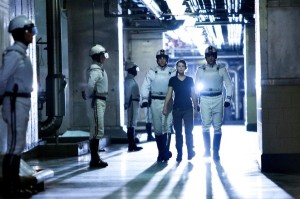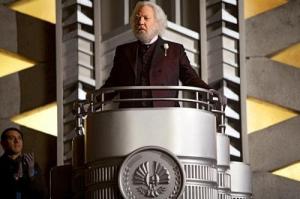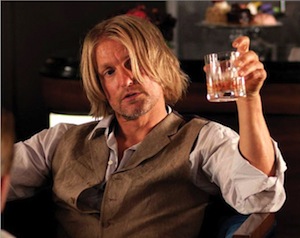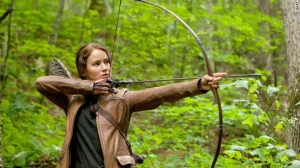Originally Posted March 24th, 2012
Though the financial juggernauts known as tweens aren't well-respected for their literary taste, lumping The Hunger Games in with most other Young Adult bestsellers would be giving it short shrift. The first in Suzanne Collins’ trilogy of mega-popular hits quickly distinguished itself as a bleak, yet accessible adventure novel that doubled as an intro to social critiques. Its path to bookstore ubiquity came with many of the caveats that seem hardcoded to the genre’s DNA; forced romances and repetitious plotting are, at this point, par for the course. Despite such missteps that hint at calculated net-widening, The Hunger Games earned its devoted following by offering readers a character, and a world worth investing in. The success is comforting proof that fads can be born with hints of urgency and substance, not just questions of “which boy should I like?”

Of course, basing a fictional world around teenagers fighting each other to the death makes for a pretty blunt, but undeniably effective means of getting hooks into readers. Collins brings to the post-apocalypse a disturbing reworking of what it is to grow up; as punishment for a long passed insurrection, the last remaining nation of the distant future forces 24 young people, ages 12 to 18, to engage in televised gladiatorial combat. Each of the states’ twelve districts offers up one boy and girl to do battle in a vast, controlled arena, where the only way out is to be the last “Tribute” standing. At the drawing for the 74th annual Hunger Games, 16 year-old Katniss Everdeen (Jennifer Lawrence) volunteers as Tribute. It’s that, or let her younger sister face certain death in her place.
It’s a pastiche of familiar ideas, a sampler menu of other, undoubtedly more challenging works. The fingerprints of The Lottery, 1984, and even Logan’s Run, are unmistakable. Those “in the know” have been touting the Japanese thriller Battle Royale as the real source of inspiration (if not outright conceptual theft), but that film’s use of blood sport as social metaphor is replaced here with a more deliberate approach.We do, after all, have two more books to set up, so it’s not surprising that roughly half the run-time of The Hunger Games is spent establishing the world surrounding the titular event.

Even at a lengthy 140 minutes, there’s no time for light touches. The gulf in living conditions between Katniss’ Ozark-ian District 12 and the pristine Capitol, a fortified city that hosts the games, is presented in broad strokes befitting names that creative. The abundance of Roman architecture and imagery will clear up any doubts over who are the scrappy upstarts, and who belongs to the “big evil empire”. An American Idol-inspired training period for the Tributes offers similar opportunity for easily identifiable satire. A takedown of voyeurism and artifice in reality programming would have had more bite, say, ten years ago, but it flies well enough thanks to a healthy dose of self-awareness.
Katniss transforms in front of the viewing public from standoffish loner to popular crowd-pleaser, thanks to a new look from her mandatory but supportive costumer, Cinna (Lenny Kravitz). Don’t expect a fluffy montage of trying on dresses at the mall. For once, getting a makeover is a justified plot driver, as catching the eyes of those who can influence the games is a necessary strategy. Director and co-scripter Gary Ross keeps the gruesome reality of kill-or-be-killed as mostly an undercurrent during the lead-up, allowing some fun and momentum to build in scenes that could have wound up maudlin.

Ross’ best work is brought out in the early quiet moments, which benefit from being just that. James Newton Howard keeps his score tactfully reserved in the opening half, letting you soak in the big moments through looks and gestures. Even in blockbuster filmmaking, a buzzing fluorescent bulb will let you know the air has gone out of the room better than any orchestra. The silence that accompanies the start of the games makes for what is, perhaps, the film’s most accomplished moment.
From that point on, The Hunger Games kicks into its high gear back-end, one no less prone to bouts of sputtering. It seems the only thing messier than an underage bloodbath is trying to film it within the boundaries of a PG-13 rating. Persistent shaky-cam is a practical solution to keeping the nitty-gritty of murder safe(ish) for youngsters, but the sense of discombobulation it can produce is off-putting. It’s a good thing Katniss specializes in the bow, because the fracas of close-range combat would have robbed her actions of appreciable impact.

It is, after all, Katniss’ story from word “go”, leaving the non-fodder supporting cast as either thinly sketched, or relegated to simple introductions. Josh Hutcherson and Liam Hemsworth form the base of a requisite but mercifully contained love triangle, with Hutcherson as fellow District 12 Tribute, Peeta. Donald Sutherland gives an intimidating turn as the authoritative President Snow, but is largely kept in the wings, with promise of greater malevolence to come in the sequels. Woody Harrleson gets the most love of the secondary players as loutish former champ Haymitch Abernathy, who’s tasked with training Katniss and Peeta. The kinds of sponsors he wants for Katniss, and the ones he could use himself, are quite different.
Though well-established as a “wildeness girl” following her revelatory performance in Winter’s Bone, Lawrence proves more than capable at mixing that same stoic resolve with the emotional grounding required of the, occasionally forced, tender moments. Survival is a pretty utilitarian personal journey, which is often limiting, but Katniss doesn’t need a grand arc because she’s given credit as a compelling character from the start. The great economy of the film’s early scenes does little to undercut our rooting interests; Collins has crafted a heroine that’s efficiently realized and eminently watchable.

It’s easy to find fault in something insanely popular if you’re among the many left out of the loop, but, all told, this is an enjoyable film. There are still plenty of yet unmentioned nit-picks; the climax is rushed, and life-saving plot devices abound, but it’s tolerable because there’s so much to enjoy at the core of The Hunger Games. No, it’s not high-art, but there’s something encouraging, if not downright exciting, about a mature, well-executed piece of popular fiction that plays to the fans, while being inviting to the uninitiated. Throw my name in with those cautiously optimistic about the next serving.
4 out of 5
The Hunger Games
Directed by Gary Ross
2012, USA

